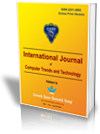How to Cite?
Komal, Er. Roop Lal Sharma, "Evaluating Denoising using various techniques based on Peak Signal-to-Noise Ratio and MeanSquare Error on CT Dental Images," International Journal of Computer Trends and Technology, vol. 68, no. 8, pp. 25-32, 2020. Crossref, https://doi.org/10.14445/22312803/IJCTT-V68I8P104
Abstract
In the field of clinical imaging, processed tomography (CT) is a critical instrument that analyzes inward structures of a patient and gives precise clinical analysis. In this test, the portion of the radiation is legitimately connected with the nature of the picture procured. That is, a high radiation portion gives an excellent picture. Be that as it may, presenting patients to high dosages of radiation is hindering to their wellbeing. In this way, to forestall the patient to consistent radiation introductions, the clinical network has been concentrating on diminishing the portion of radiation applied in CT checks. In this paper, we propose a special and nuclear method for the expulsion of Gaussian commotion from an uproarious advanced picture which isn`t just fit for identifying and wiping out Gaussian clamour, present in the computerized picture yet in addition fit for creating an upgraded yield picture. We additionally attempt to set up that our proposed technique is giving a much better outcome in contrast with other well-known channels or calculations. To do that we have conjured a similar report in trial results and examination part of these paper by figuring PSNR, MSE and MAE.
Keywords
PSNR, MSE, MAE, CT
Reference
[1] Kamaldeep Joshi, Rajkumar Yadav, Sachin Allwadhi, “PSNR and MSE Based Investigation of LSB”, 2016 International Conference on Computational Techniques in Information and Communication Technologies (ICCTICT).
[2] Shakunthala M, Helen Prabha K, “ Preprocessing Analysis Of Brain Images With Atherosclerosis”, IEEE, 2019.
[3] G. Sasibhushana Rao1, M. Laxmi Prasanna Rani2, and B. Prabhakara Rao3, “Gray Scale Medical Image Compression using LM Algorithm”, IEEE, 2019.
[4] Rahul Sahu. Prof. M.P.Parsai, “ Comparison of digital image denoising method using various Transforms on Satellite Imagery”, 2019 2nd International Conference on Intelligent Computing, Instrumentation and Control Technologies (ICICICT).
[5] Seema R, Dr Kiran Bailey, “ Multi-frame Image SuperResolution by Interpolation and Iterative Backward Projection”, 2019 International Conference on Signal Processing and Communication (ICSPC -2019), March. 29 – 30, 2019, Coimbatore, INDIA.
[6] Nguyen Thanh Trung, Trinh Dinh Hoan, Nguyen Linh Trung, Luu Manh Ha, “Robust Denoising of Low-Dose CT Images using Convolutional Neural Networks”, 2019 6th NAFOSTED Conference on Information and Computer Science (NICS).
[7] Takao Fuji, Yutaka Nomura, and Hideto Shirai, “Generation and Characterization of Phase-Stable SubSingle-Cycle Pulses at 3000 cm”, Ieee Journal Of Selected Topics In Quantum Electronics, Vol. 21, NO. 5, September/October 2015.
[8] Muhammad Faris, Tariq Javid, Kashaf Fatima, Maliha Azhar, Rohana Kamran,” Detection of tumour region in MR image through the fusion of Dam construction and K-mean clustering algorithms”, 2019 International Conference on Computing, Mathematics and Engineering Technologies – iCoMET 2019.
[9] Dilovan Asaad Zebari, Habibollah Haron, Subhi R. M. Zeebaree, Diyar Qader Zeebaree, “Enhance the Mammogram Images for Both Segmentation and Feature Extraction Using Wavelet Transform”, 2019 International Conference on Advanced Science and Engineering (ICOASE), University of Zakho, Duhok Polytechnic University, Kurdistan Region, Iraq.
[10] Juned Ahmed Mazumder, K. Hemachandra, “Image Steganography Using the Fusion of Quantum Computation and Wavelet Transformation”, Proceedings of the Third International Conference on Computing Methodologies and Communication (ICCMC 2019) IEEE Xplore Part Number: CFP19K25-ART; ISBN: 978-1-5386-7808-4.


